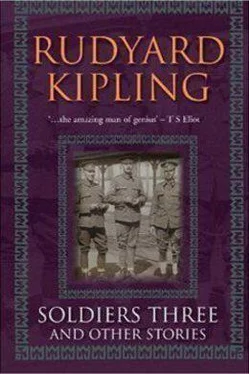Rudyard Kipling - Soldiers Three
Здесь есть возможность читать онлайн «Rudyard Kipling - Soldiers Three» весь текст электронной книги совершенно бесплатно (целиком полную версию без сокращений). В некоторых случаях можно слушать аудио, скачать через торрент в формате fb2 и присутствует краткое содержание. Год выпуска: 2014, Издательство: epubBooks Classics, Жанр: Классическая проза, на английском языке. Описание произведения, (предисловие) а так же отзывы посетителей доступны на портале библиотеки ЛибКат.
- Название:Soldiers Three
- Автор:
- Издательство:epubBooks Classics
- Жанр:
- Год:2014
- ISBN:нет данных
- Рейтинг книги:5 / 5. Голосов: 1
-
Избранное:Добавить в избранное
- Отзывы:
-
Ваша оценка:
- 100
- 1
- 2
- 3
- 4
- 5
Soldiers Three: краткое содержание, описание и аннотация
Предлагаем к чтению аннотацию, описание, краткое содержание или предисловие (зависит от того, что написал сам автор книги «Soldiers Three»). Если вы не нашли необходимую информацию о книге — напишите в комментариях, мы постараемся отыскать её.
Soldiers Three — читать онлайн бесплатно полную книгу (весь текст) целиком
Ниже представлен текст книги, разбитый по страницам. Система сохранения места последней прочитанной страницы, позволяет с удобством читать онлайн бесплатно книгу «Soldiers Three», без необходимости каждый раз заново искать на чём Вы остановились. Поставьте закладку, и сможете в любой момент перейти на страницу, на которой закончили чтение.
Интервал:
Закладка:
The Peace of God and the favour of His Prophet be upon this house and all that is in it! Shafizullah, rope the mottled mare under the tree and draw water. The horses can stand in the sun, but double the felts over the loins. Nay, my friend, do not trouble to look them over. They are to sell to the Officer fools who know so many tilings of the horse. The mare is heavy in foal; the gray is a devil unlicked; and the dun—but you know the trick of the peg. When they are sold I go back to Pubbi, or, it may be, the Valley of Peshawur.
O friend of my heart, it is good to see you again. I have been bowing and lying all day to the Officer–Sahibs in respect to those horses; and my mouth is dry for straight talk. Auggrh! Before a meal tobacco is good. Do not join me, for we are not in our own country. Sit in the veranda and I will spread my cloth here. But first I will drink. In the name of God returning thanks, thrice! This is sweet water, indeed—sweet as the water of Sheoran when it comes from the snows.
They are all well and pleased in the North—Khoda Baksh and the others. Yar Khan has come down with the horses from Kurdistan—six and thirty head only, and a full half pack–ponies—and has said openly in the Kashmir Serai that you English should send guns and blow the Amir into Hell. There are fifteen rolls now on the Kabul road; and at Dakka, when he thought he was clear, Yar Khan was stripped of all his Balkh stallions by the Governor! This is a great injustice, and Yar Khan is hot with rage. And of the others: Mahbub Ali is still at Pubbi, writing God knows what. Tugluq Khan is in jail for the business of the Kohat Police Post. Faiz Beg came down from Ismail–ki–Dhera with a Bokhariot belt for thee, my brother, at the closing of the year, but none knew whither thou hadst gone: there was no news left behind. The Cousins have taken a new run near Pakpattan to breed mules for the Government carts, and there is a story in Bazar of a priest. Oho! Such a salt tale! Listen—
Sahib, why do you ask that? My clothes are fouled because of the dust on the road. My eyes are sad because of the glare of the sun. My feet are swollen because I have washed them in bitter water, and my cheeks are hollow because the food here is bad. Fire burn your money! What do I want with it? I am rich and I thought you were my friend; but you are like the others—a Sahib. Is a man sad? Give him money, say the Sahibs. Is he dishonoured? Give him money, say the Sahibs. Hath he a wrong upon his head? Give him money, say the Sahibs. Such are the Sahibs, and such art thou—even thou.
Nay, do not look at the feet of the dun. Pity it is that I ever taught you to know the legs of a horse. Footsore? Be it so. What of that? The roads are hard. And the mare footsore? She bears a double burden, Sahib.
And now I pray you, give me permission to depart. Great favour and honour has the Sahib done me, and graciously has he shown his belief that the horses are stolen. Will it please him to send me to the Thana? To call a sweeper and have me led away by one of these lizard–men? I am the Sahib's friend. I have drunk water in the shadow of his house, and he has blackened my face. Remains there anything more to do? Will the Sahib give me eight annas to make smooth the injury and—complete the insult—?
Forgive me, my brother. I knew not—I know not now—what I say. Yes, I lied to you! I will put dust on my head—and I am an Afridi! The horses have been marched footsore from the Valley to this place, and my eyes are dim, and my body aches for the want of sleep, and my heart is dried up with sorrow and shame. But as it was my shame, so by God the Dispenser of Justice—by Allah–al–Mumit—it shall be my own revenge!
We have spoken together with naked hearts before this, and our hands have dipped into the same dish and thou hast been to me as a brother. Therefore I pay thee back with lies and ingratitude—as a Pathan. Listen now! When the grief of the soul is too heavy for endurance it may be a little eased by speech, and, moreover, the mind of a true man is as a well, and the pebble of confession dropped therein sinks and is no more seen. From the Valley have I come on foot, league by league, with a fire in my chest like the fire of the Pit. And why? Hast thou, then, so quickly forgotten our customs, among this folk who sell their wives and their daughters for silver? Come back with me to the North and be among men once more. Come back, when this matter is accomplished and I call for thee! The bloom of the peach–orchards is upon all the Valley, and here is only dust and a great stink. There is a pleasant wind among the mulberry trees, and the streams are bright with snow–water, and the caravans go up and the caravans go down, and a hundred fires sparkle in the gut of the Pass, and tent–peg answers hammer–nose, and pack–horse squeals to pack–horse across the drift smoke of the evening. It is good in the North now. Come back with me. Let us return to our own people! Come!
Whence is my sorrow? Does a man tear out his heart and make fritters thereof over a slow fire for aught other than a woman? Do not laugh, friend of mine, for your time will also be. A woman of the Abazai was she, and I took her to wife to staunch the feud between our village and the men of Ghor. I am no longer young? The lime has touched my beard? True. I had no need of the wedding? Nay, but I loved her. What saith Rahman: 'Into whose heart Love enters, there is Folly and naught else. By a glance of the eye she hath blinded thee; and by the eyelids and the fringe of the eyelids taken thee into the captivity without ransom, and naught else. ' Dost thou remember that song at the sheep–roasting in the Pindi camp among the Uzbegs of the Amir?
The Abazai are dogs and their women the servants of sin. There was a lover of her own people, but of that her father told me naught. My friend, curse for me in your prayers, as I curse at each praying from the Fakr to the Isha, the name of Daoud Shah, Abazai, whose head is still upon his neck, whose hands are still upon his wrists, who has done me dishonour, who has made my name a laughing–stock among the women of Little Malikand.
I went into Hindustan at the end of two months—to Cherat. I was gone twelve days only; but I had said that I would be fifteen days absent. This I did to try her, for it is written: 'Trust not the incapable.' Coming up the gorge alone in the falling of the light, I heard the voice of a man singing at the door of my house; and it was the voice of Daoud Shah, and the song that he sang was ' Dray wara yow dee '—'All three are one.' It was as though a heelrope had been slipped round my heart and all the Devils were drawing it tight past endurance. I crept silently up the hill–road, but the fuse of my matchlock was wetted with the rain, and I could not slay Daoud Shah from afar. Moreover, it was in my mind to kill the woman also. Thus he sang, sitting outside my house, and, anon, the woman opened the door, and I came nearer, crawling on my belly among the rocks. I had only my knife to my hand. But a stone slipped under my foot, and the two looked down the hillside, and he, leaving his matchlock, fled from my anger, because he was afraid for the life that was in him. But the woman moved not till I stood in front of her, crying: 'O woman, what is this that thou hast done?' And she, void of fear, though she knew my thought, laughed, saying: 'It is a little thing. I loved him, and thou art a dog and cattle–thief coming by night. Strike!' And I, being still blinded by her beauty, for, O my friend, the women of the Abazai are very fair, said: 'Hast thou no fear?' And she answered: 'None—but only the fear that I do not die.' Then said I: 'Have no fear.' And she bowed her head, and I smote it off at the neck–bone so that it leaped between my feet. Thereafter the rage of our people came upon me, and I hacked off the breasts, that the men of Little Malikand might know the crime, and cast the body into the water–course that flows to the Kabul river. Dray wara yow dee! Dray wara yow dee! The body without the head, the soul without light, and my own darkling heart—all three are one—all three are one!
Читать дальшеИнтервал:
Закладка:
Похожие книги на «Soldiers Three»
Представляем Вашему вниманию похожие книги на «Soldiers Three» списком для выбора. Мы отобрали схожую по названию и смыслу литературу в надежде предоставить читателям больше вариантов отыскать новые, интересные, ещё непрочитанные произведения.
Обсуждение, отзывы о книге «Soldiers Three» и просто собственные мнения читателей. Оставьте ваши комментарии, напишите, что Вы думаете о произведении, его смысле или главных героях. Укажите что конкретно понравилось, а что нет, и почему Вы так считаете.












